Utah S.B. 149: Creating a Safe Space for Developers While Regulating Deceptive AI
Published 05/09/2024
Originally published by Truyo.
Written by Dan Clarke.
Utah’s foray into the realm of artificial intelligence (AI) regulation is marked by the passage of Senate Bill 149, the Artificial Intelligence Policy Act. While many states grapple with the complexities of AI governance, Utah’s rather fast and reactive approach emphasizes consumer protection and seeks to hold businesses accountable for deceptive AI usage, going beyond existing consumer protection laws to create a law that covers AI deployments.
Key provisions of S.B. 149 include transparency obligations for companies leveraging AI, the establishment of the Office of AI Policy, and the creation of an AI Learning Lab Program. This program serves as both a regulatory safe harbor for developers and a proactive platform for studying AI risks and benefits. With potential fines for violations and criminal charges for AI-related crimes, the bill aims to strike a balance between fostering AI innovation and safeguarding consumer interests.
About Utah’s S.B. 149:
- The bill aims to hold companies accountable for deceptive AI usage while avoiding heavy-handed regulations that could stifle innovation through AI.
- S.B. 149 brings generative AI usage within the purview of consumer protection laws, making businesses responsible for deceptive AI behavior, not the AI product used.
- Transparency is paramount, calling on certain professions, such as mental health providers and telemarketers, to disclose upfront when interacting with or using material created by generative AI.
- Violations of the law could result in administrative fines or civil penalties from $2,500 to $5,000 with potential criminal charges for offenses committed using generative AI.
- The bill establishes the Office of AI Policy within Utah’s consumer protection division to oversee AI-related matters such as the AI Learning Lab Program.
- The AI Learning Lab Program is created to study AI risks and benefits in a supervised environment to provide recommendations to lawmakers.
- Developers can seek regulatory mitigation agreements to test AI products without fear of severe penalties.
At this time, S.B. 149 has been passed by the legislature and is fully enrolled and awaiting signature from Governor Spencer Cox, which we expect it will. Utah’s AI legislation reflects a growing trend among states to address AI governance independently, amidst a patchwork of evolving regulations.
While other states like California and Colorado have introduced their own AI regulations, Utah’s approach stands out for its simplicity and potential long-reaching impact. As AI continues to shape our technological landscape, Utah’s legislation sets a precedent for responsible AI development and regulation nationwide.
About the Author

Unlock Cloud Security Insights
Subscribe to our newsletter for the latest expert trends and updates
Related Articles:
How CSA STAR Helps Cloud-First Organizations Tackle Modern Identity Security Risks
Published: 02/13/2026
The Great Divide: How AI Is Splitting the Cybersecurity Landscape
Published: 02/12/2026
Offboarding Under Pressure: How to Keep SaaS and AI Data Secure During Layoffs
Published: 02/10/2026









.jpeg)